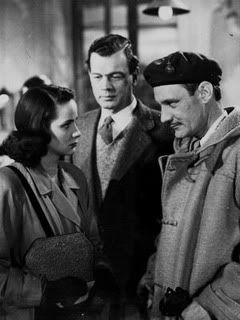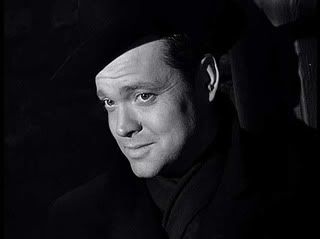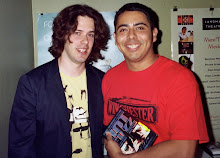
The problem about writing about a film that is deemed a masterpiece is what does one say to add to its mastery of cinematic conventions. What can you say about the sometimes eerie, dark, and playful zither score by Anton Karas? What can you say about the perfect black and white photography by Robert Krasker? How about the small but powerful performance by Orson Welles which he was clearly born to play? Graham Greene's script? Carol Reed's direction? And Yada Yada Yada.... everything else.
I am not sure.
Watching The Third Man for the second time, I realized how funny this dark post WWII film noir really is. The opening narration done by Trevor Howard sets the tone for the film as Howard tells us in his dry British tone that “Vienna doesn't really look any worse than a lot of other European cities. Bombed about a bit” as the images of a completely destroyed Vienna are presented. A bit of a understatement if you ask me. The exchanges between Calloway (Trevor Howard) and Martins (Joseph Cotton) are pure screwball dialogue as they both bicker back and forth like old school friends. Take this exchange:
Calloway: I told you to go away, Martins. This isn't Santa Fe. I'm not a sheriff and you aren't a cowboy. You've been blundering around with the worst bunch of racketeers in Vienna, your precious Harry's friends, and now you're wanted for murder.
Martins: Put down drunk and disorderly too.
Calloway: I have.

Or this one:
Martins: Listen, Callahan!
Calloway: Calloway. I'm English, not Irish
Both Martins and Calloway share a quick and witty connection that lacks from Martins and Harry Lime friendship, foreshadowing Martins decision to end Lime's life at the end of the film. Friendship is a theme that the film throws our way as if to ask us what a friend truly is? Lime only looks out for only himself leaving both Anna and Martins to fend for themselves. Anna still cares for Lime even after he ditches her for his fake death leaving Martins to suffer his doomed loneliness. Martins and Calloway only begin to help each other when Martins makes up his mind to catch Lime. It is Calloway and Sergeant Paine that share the closest thing to a friendship the film has to offer. So what does Graham Greene do to this relationship? Ends it. This post war world has nothing to offer..... friendship is dead.
But still... what could one say about The Third Man.
While smoking a cigarette outside, waiting for class to start, a fellow film student comes my way and we begin to speak about certain films we've just seen recently. This young man had just seen The Third Man and was somewhat dissatisfied by what he saw. Knowing very well that not everyone might like a film that is deemed so highly as The Third Man is, I asked him why he didn't like the film. His response was “I don't know..... it seemed like the director didn't have a tripod during the majority of the shoot. The whole film was lopsided. Not professional of him to do that.” Ladies and Gentlemen... these are our future filmmakers.

Like my counterpart, I too hold The Third Man to be a classic film and suffer the dilemma of what my voice can add to the discussion of the film. Not much, I am sure, but if you listen to the LAMBcast, (and you should) then you might know that I am thought of as the "classic film fan" and The Third Man is as great a film as any to introduce movie buffs to more classic movies. Starring Joseph Cotten, Orson Welles and Trevor Howard, directed by Carol Reed, produced by David O. Selznick and written by Graham Greene, the principal players have amongst them made such films as Fallen Idol, Touch of Evil, Gone With The Wind, Brief Encounter and Rebecca.
Following writer Holly Martins to post-war Vienna as he investigates the death of his friend Harry Lime, the movie is almost noir in its outlook. Deception is around every cobblestone corner, Holly cannot trust anyone and trying to do the right thing just makes matters worse for himself. He dodges British, French and Russian cops, falls in love with Harry's girlfriend, bombs spectacularly at a literature lecture and drinks far too much. Cotten is perfect in the role, but sadly is overshadowed by Orson Welles before the movie even begins. In those days, studios did not think to keep Welles supporting role a surprise like Spacey in Se7en, so from the jump, audiences are waiting for Welles, who doesn't disappoint.

But for me, the film is all Cotten. The studio had wanted Jimmy Stewart and Cary Grant in the roles of Cotten and Welles, but the characters are much better suited to these actors and Cotten shows how talented he was, but taking away the movie while he has the chance. You can get so wrapped up in his story that you forget you're waiting for Orson. And that is a testament to how well the film holds up. Sophisticated audiences of today will still be captivated by the great story, terrific performances and tight direction. They will probably even be more appreciative of the un-Hollywood ending of the film that audiences originally were. In keeping with writing A-Z and spoiler free, I won't reveal it, but leave you with this final shot.







3 comments:
I asked a day or two ago what people would like to hear when I start podcasting in the next few weeks. Blake from Bitchin' Film Reviews mentioned that he'd like to hear about what classic films I'm watching, seeing as how I don't talk about them much on my site.
I'll quite likely oblige him, since I do watch a lot of classics, however I had to smile when I read your post...since I don't write about too many classics for the very reason you mentioned. What can one say about them that hasn't already been said?
I will say this - if you partake in Richard Linklater's upcoming film ME AND ORSON WELLES, you'll be treated to a rather cute THIRD MAN reference.
Great post!
I've missed these columns. One of these days I'll dive into my Janus set, but until then I have your take. Great review.
Can't believe this thing got posted. I figured it would go missing like the Ugetsu review.
Expanding on a classical Hollywood film such as The Third Man, The Searchers, or Citizen Kane is biggest difficulty I face while writing these post. Do I take a postmodern approach like Chuck Klosterman? Do I take it to super personal areas of ones own life like Nathan Rabin in his book "The Big Rewind"?
When you guys go about writing about film, what is your strategy? Do you use a specific voice or theory to expand on a film?
Post a Comment